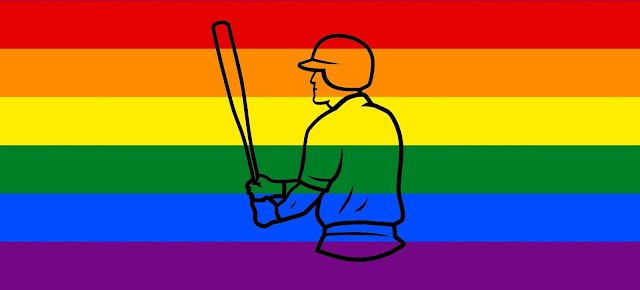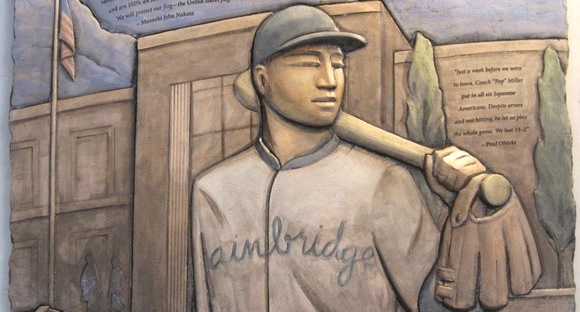In 1866, the U.S. Civil War was barely over and the ink was still drying on the newly ratified Thirteenth Amendment to the Constitution. Slavery had officially been abolished, but, throughout the country, Americans of African descent were still harshly being denied access to basic human and civil rights. A new generation of black leaders was emerging to follow in the footsteps of abolitionists such as Frederick Douglass and Harriet Tubman. Among them were Octavius Catto in Philadelphia, and Charles Remond Douglass, youngest son of Frederick Douglass. It's unclear whether Catto and Douglass intended to be baseball pioneers, but they both sought to recruit and organize young black men. In the second half of the 19th century, the best way to do that was through baseball.
Finding Baseball
A perpetual journey through the heart of a game
header image

Saturday, October 22, 2016
Sunday, July 24, 2016
LGBT & the MLB: 1976 - 2016
Glenn Burke was an outfielder for the Dodgers and A's in the late 1970s. Although he never publicly came out during his career, most of his teammates were aware of his sexual orientation. Well-liked by the players, but seen as a public image problem by Dodger management, he was traded to Oakland for arguably a less talented player (the motive of the trade is still debated). With the A's, Burke was subjected to derogatory treatment and hateful speech, pushing him out of the league for good. Years later, he confided "I finally got to the point where it was more important to be myself than a baseball player." 35 years after Burke's retirement, in 2014, pitching prospect Tyler Dunnington played one season in the minors, where he was not comfortable coming out to his teammates. He endured hearing homophobic language in the locker room, including the condoning of violence towards LGBT individuals. At the end of the year he walked away from the game he loved, later saying "I felt I had to choose between being an out gay man or playing baseball."
Tuesday, May 31, 2016
Kenichi Zenimura and Japanese-American Internment Leagues
In 1942, more than 110,000 Japanese-Americans were abruptly removed from their homes and forced to re-locate on ten internment camps scattered through-out the western United States. Among the interned was Kenichi Zenimura; a star player, coach and organizer in the California Japanese League. Upon arriving at the Gila River War Relocation Center, he immediately began transforming a patch of harsh Arizona desert into a beautiful baseball oasis. Considering the lack of resources available to him, this required a rare brand of ingenuity. According to the Nisei Baseball Research Project, he extended a pipe from one of the laundry rooms to grow the outfield grass. Children were recruited to meticulously remove the pebbles from the infield dirt and re-purpose them as ground cover in the dugouts and stands. Along with excess wood from the lumber yard, every other post was removed from the perimeter fence and used to construct a backstop and bleachers. Flour was acquired from the dining hall to chalk the foul lines and high-growing shrubs were planted along the path of the outfield "wall". Other internment camps built baseball fields of their own, but "Zenimura Stadium" was the crown jewel (a literal diamond in the rough).
Saturday, April 30, 2016
Jackie Robinson's 1945 Tour of Venezuela
On October 23, 1945, Jackie Robinson signed a historic contract to play with the Montreal Royals, the top-tier minor league franchise of the Brooklyn Dodgers. The signing and the legendary career that resulted are well-documented. His tour of Venezuela that immediately followed the signing, as part of a Negro Leagues all-star squad, is barely documented at all. Information about the trip varies from source-to-source. Depending upon where you look, it was either two months or ten weeks. Another source specifies 24 games without mentioning a time frame. Some researchers claim that Branch Rickey himself assigned Robinson to the traveling team, while most others fail to identify the impetus for him making the trip. Whatever the reason, and for ever how long, the American All-Stars' (referred to by the local press as Las Estrellas Negras - The Black Stars) visit to Caracas and Maracaibo was an important step in Robinson's development as a player.
Monday, March 28, 2016
The History of Baseball's History (Part II): Beyond Doubleday

In Part I of this post, I review the nationalistic debate that led to the formation of the Mills Commission. Assembled by Albert Spalding, who insisted that baseball was an American invention, their task was to determine the origin of the sport once and for all. Spalding hand-picked the members himself,
choosing only those who agreed with him. To head the commission, he
appointed his good friend, former National League President A.G. Mills (years
earlier, Mills had delivered a patriotic speech on baseball's early development,
while the crowd banged their tables and chanted "No rounders! No
rounders! No rounders!"). It took the commission three long years to
release its findings. They finally concluded the game was created in 1839
by late Civil War general Abner Doubleday. A small town in upstate
New York, by the name of Cooperstown, was picked for the setting. The
commission's sole piece of evidence was the recollection of a man who was only
five years old at the time of the events in his testimony. Doubleday, who
kept a regular diary and enjoyed penning letters, made no such claims - at
least not in his writings (in fact, he barely mentioned the sport at all).
Despite having known Doubleday while he was alive, neither Spalding nor
Mills added any first-hand knowledge in support of the commission's report.
Wednesday, February 10, 2016
The History of Baseball's History (Part I): Chadwick-Spalding

Everyone knows that the game of baseball was invented by Abner Doubleday. Or was it Alexander Cartwright? Or could it have been a lesser-known New Yorker by the name of William R. Wheaton? Whoever invented it, one thing we do know for certain is that sport was adapted from the similar game of Rounders... or Town Ball... or the children's game One Old Cat. If you ever want to make your head spin, spend a day looking into the origins of America's favorite bat-and-ball game. What you'll find is that baseball history has a history.
Monday, November 30, 2015
Miners, Mormons and 120 Years of Baseball in South Africa
If you run a basic internet search for the history of baseball in South Africa, you'll find a few articles that start with the game's appearance in 1895 and then quickly jump ahead to the 2000 Olympics. To discover what happened during the century in between requires some digging. You must dig past the greater popularity of "the big three" (soccer, cricket and rugby); past the absence of head-line grabbing superstars in the likeness of Babe Ruth or Willie Mays; and down deep through the decades of segregation and discrimination that conceal a large part of the story. If you dig deep enough, you'll eventually unearth a treasure chest full of the surprising and curious events that led to the unlikely rise of baseball far away from its native land.
Saturday, October 31, 2015
1908 World Series: The Curse Begins
The day is October 14, 1908. The Chicago Cubs have just defeated the Tigers to repeat as World Series Champions. The win caps a five-game match-up featuring a hall of fame infield of Tinkers, Evers and Chance, a 21-year old Ty Cobb, and great pitching from Cubs' hurlers Orval Overall and Mordecai "Three Finger" Brown. Yet there is no joy in Chicago. Cubs fans are angry and the players feel betrayed. Sports writers are fed up with their working conditions and team owners will soon meet to debate, among other topics, whether to do away with the World Series all together. Just one week earlier, the city was riding high with anticipation. To find out what went wrong, let's rewind the clock.
Monday, August 31, 2015
The Unknown Journey of the Havana Sugar Kings
The Havana Sugar Kings was a Cuban-based team, founded in 1946 by Joe Cambria, an Italian-born scout in the U.S. professional baseball system, and sold in 1954 to Roberto "Bobby" Maduro, a Cuban of Jewish descent. They won league championships in 1947, '48, and '57 as minor-league affiliates of the Senators and Reds, before growing tensions with Castro's government prompted the them to embark on a journey of Homeric proportions. The year was 1960 and the team once known as The Cubans was heading to America. It would take them a full decade to find a permanent home there.
Monday, July 27, 2015
The Opposite of Baseball Diplomacy
Subscribe to:
Comments (Atom)







